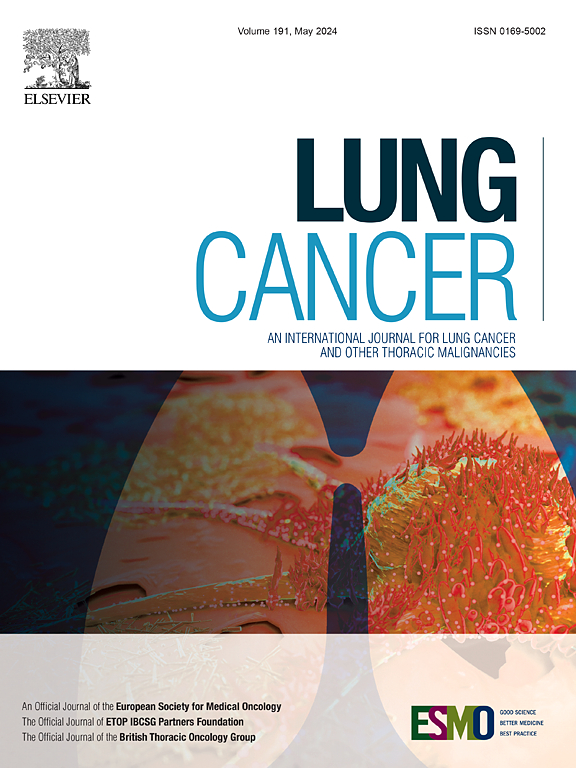Adjuvant therapy in pStage IA1–IIA lung adenocarcinoma (pN0): A multicenter study focusing on EGFR mutations and recurrence patterns (CReGYT-01 EGFR study)
IF 4.4
2区 医学
Q1 ONCOLOGY
引用次数: 0
Abstract
Background
Adjuvant treatment strategies based on EGFR mutation status remain unestablished in stage I–II lung adenocarcinoma. Although UFT is an established adjuvant therapy in Japan for resected pathological N0 (pN0) lung adenocarcinoma, its clinical utility according to EGFR mutation status remains unclear. This study aimed to evaluate the efficacy of UFT and recurrence patterns in pStage IA1–IIA disease, with a primary focus on pStage IA3–IIA and the influence of EGFR mutation status.
Methods
This multicenter retrospective study included 2,462 patients with pStage IA1–IIA lung adenocarcinoma (TNM 8th edition) who underwent complete resection at 21 institutions in Japan (2015–2018). Propensity score matching was employed to adjust for baseline differences between treatment groups. We evaluated the survival benefit of UFT by EGFR mutation status and analyzed recurrence patterns based on EGFR status and other clinicopathological variables.
Results
In the post-PSM cohort (N = 600), UFT significantly improved overall survival (OS) (p = 0.007, HR = 0.546), particularly in EGFR wild-type patients (p < 0.001, HR = 0.403). UFT also prolonged recurrence-free survival (RFS) in EGFR wild-type cases (p = 0.004, HR = 0.604). No OS or RFS benefit was observed in EGFR mutation-positive patients. Subgroup analysis showed that UFT provided significant OS benefit in patients with high-malignancy histological subtypes such as solid/micropapillary (HR = 0.32, 95 % CI: 0.13–0.80). EGFR mutation and lymphovascular invasion were independent predictors of recurrence, with EGFR mutations associated specifically with distant and CNS recurrence.
Conclusions
Adjuvant UFT improves OS and RFS in EGFR wild-type pStage IA3–IIA lung adenocarcinoma, particularly in patients with high-risk pathological features. In contrast, UFT is ineffective in EGFR mutation-positive cases, highlighting the need for refined adjuvant treatment strategies tailored to EGFR status and tumor biology in early-stage lung adenocarcinoma with pathological N0 (pN0).
pia1 - iia期肺腺癌的辅助治疗:一项关注EGFR突变和复发模式的多中心研究(CReGYT-01 EGFR研究)
背景:在I-II期肺腺癌中,基于EGFR突变状态的辅助治疗策略尚未建立。虽然UFT在日本是病理切除的N0 (pN0)肺腺癌的辅助治疗方法,但其根据EGFR突变状态的临床应用尚不清楚。本研究旨在评估UFT在pStage IA1-IIA疾病中的疗效和复发模式,主要关注pStage IA3-IIA和EGFR突变状态的影响。方法本多中心回顾性研究纳入了日本21家机构(2015-2018)的2462例pi_1 - iia期肺腺癌(TNM第8版)全切除术患者。采用倾向评分匹配来调整治疗组之间的基线差异。我们通过EGFR突变状态评估了UFT的生存获益,并基于EGFR状态和其他临床病理变量分析了复发模式。结果在psm后队列(N = 600)中,UFT显著提高了总生存率(OS) (p = 0.007, HR = 0.546),尤其是EGFR野生型患者(p <;0.001, hr = 0.403)。UFT还延长了EGFR野生型病例的无复发生存期(RFS) (p = 0.004, HR = 0.604)。EGFR突变阳性患者未观察到OS或RFS获益。亚组分析显示,UFT在实体/微乳头状等高恶性组织学亚型患者中提供了显著的OS益处(HR = 0.32, 95% CI: 0.13-0.80)。EGFR突变和淋巴血管侵袭是复发的独立预测因素,EGFR突变与远端和中枢神经系统复发特异性相关。结论辅助UFT可改善EGFR野生型p3iia期肺腺癌的OS和RFS,特别是具有高危病理特征的患者。相比之下,UFT在EGFR突变阳性病例中无效,这突出表明需要针对病理N0 (pN0)的早期肺腺癌的EGFR状态和肿瘤生物学制定精确的辅助治疗策略。
本文章由计算机程序翻译,如有差异,请以英文原文为准。
求助全文
约1分钟内获得全文
求助全文
来源期刊

Lung Cancer
医学-呼吸系统
CiteScore
9.40
自引率
3.80%
发文量
407
审稿时长
25 days
期刊介绍:
Lung Cancer is an international publication covering the clinical, translational and basic science of malignancies of the lung and chest region.Original research articles, early reports, review articles, editorials and correspondence covering the prevention, epidemiology and etiology, basic biology, pathology, clinical assessment, surgery, chemotherapy, radiotherapy, combined treatment modalities, other treatment modalities and outcomes of lung cancer are welcome.
 求助内容:
求助内容: 应助结果提醒方式:
应助结果提醒方式:


